Antibiotics are broad-spectrum drugs, the main therapeutic properties of which are suppression of the pathogenic activity of bacterial microorganisms. Some types of drugs in this category are effective against certain strains of fungal infection.
At a temperature in an adult patient or child, which is caused by an inflammatory process in the throat, bronchopulmonary tissue, intestines, urogenital system, paranasal sinuses, antibacterial agents are included in the general course of medication therapy.
Record content:
- 1 When are antibiotics prescribed at a temperature?
- 2 When should you not drink antibiotics?
-
3 What groups of antibiotics are used at temperature?
- 3.1 With angina
- 3.2 With ARVI, flu
- 3.3 With pneumonia
- 3.4 For infectious, inflammatory diseases
-
4 The best antibiotics in injections
-
4.1 For children
- 4.1.1 Augmentin
- 4.1.2 Ciprofloxacin
- 4.1.3 Ceftriaxone
-
4.2 For adults
- 4.2.1 Sultasin
- 4.2.2 Rocefin
- 4.2.3 Amoxiclav
-
4.1 For children
-
5 Tablet names
-
5.1 For children
- 5.1.1 Tetracycline
- 5.1.2 Sumamed
- 5.1.3 Flemoklav Solutab
-
5.2 For adults
- 5.2.1 Amoxicillin
- 5.2.2 Azithromycin
- 5.2.3 Suprax
-
5.1 For children
- 6 The cheapest antibiotics for temperature
- 7 List of the safest drugs
- 8 Antibiotic videos
When are antibiotics prescribed at a temperature?
Antibiotics at a temperature are prescribed only by the attending physician, pediatrician, infectious disease specialist, a pulmonologist or other specialist if the patient suffers from an inflammatory disease bacterial etiology. In this case, a diagnostic examination of the patient should be performed to determine the type of bacterial infection that provokes a painful state of the body.
In an adult patient or child with a body temperature above 38 °, antibacterial agents are part of the complex therapy. In this case, the fact of infection of the patient with gram-positive or gram-negative microorganisms must be laboratory confirmed.
In combination with antibiotics, it is necessary to take antipyretic medications. Antibacterial drugs are prescribed only to patients who are infected with pathogenic microorganisms that are sensitive to the active substances of the drug.
The use of antibiotics at high body temperature is advisable to achieve the following therapeutic effect:
- providing bacteriostatic or bactericidal action against the focus of infection;
- increasing the body's resistance to pathogens;
- a decrease in the severity of the inflammatory process, due to the suppression of which the heat exchange of the body is stabilized;
- preventing overheating of the body from too high a temperature;
- acceleration of the physiological process of recovery.
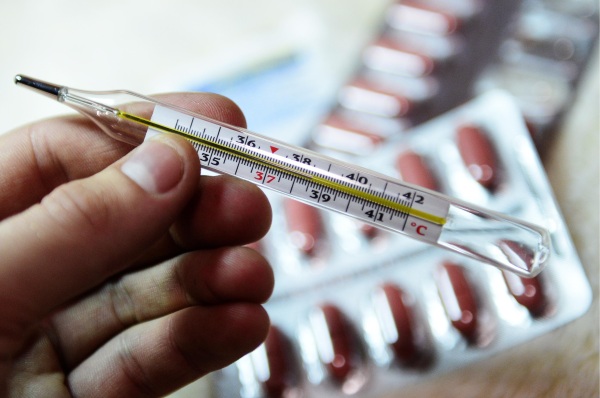 The use of an antibiotic is not justified in all clinical cases. The appointment of drugs in this group should be performed only in relation to a specific strain of pathogens.
The use of an antibiotic is not justified in all clinical cases. The appointment of drugs in this group should be performed only in relation to a specific strain of pathogens.
Uncontrolled and unauthorized intake of antibacterial agents will not lead to a decrease in temperature, but can cause a decrease in general immunity, as well as provoke a deterioration in general well-being.
When should you not drink antibiotics?
Antibiotics at a temperature in an adult or a child are categorically contraindicated for admission in the presence of the following circumstances:
- high fever caused by viral microorganisms;
- a painful condition of the body arose due to a cold or prolonged hypothermia;
- an increase in body temperature is provoked by acute immunodeficiency or hormonal imbalance;
- in the tissues of the brain, which are responsible for the physiological regulation of the body's heat exchange, tumor neoplasms of a benign or oncological origin were found;
- the patient maintains stable body temperature indicators, which are within 37 ° (if an adult patient or a child the fever does not reach 38 °, then it is necessary to provide the body with an abundant drink, but at the same time do not use the means of drug therapy);
- in the course of laboratory tests for bacterial inoculation of biological material, the fact of infection of the body with gram-positive, gram-negative, anaerobic microorganisms was not confirmed.
Antibiotics do not need to be drunk until the results of an analysis of the microflora of the inflamed tissue or mucous membrane are obtained. Medicines in this category should be selected on an individual basis and only after the specific type of bacterial infection has been identified.
What groups of antibiotics are used at temperature?
Antibiotics at a temperature in an adult and children of a younger, middle and older age group are used depending on what kind of disease is diagnosed.
With angina
Patients suffering from acute angina with signs of a strong inflammatory process, edema of the mucous membrane and throat tissues, temperature readings of 38 ° and above, antibiotics of the following pharmacological groups are prescribed:
-
penicillins, which are the ancestors of medicines with antibacterial activity;
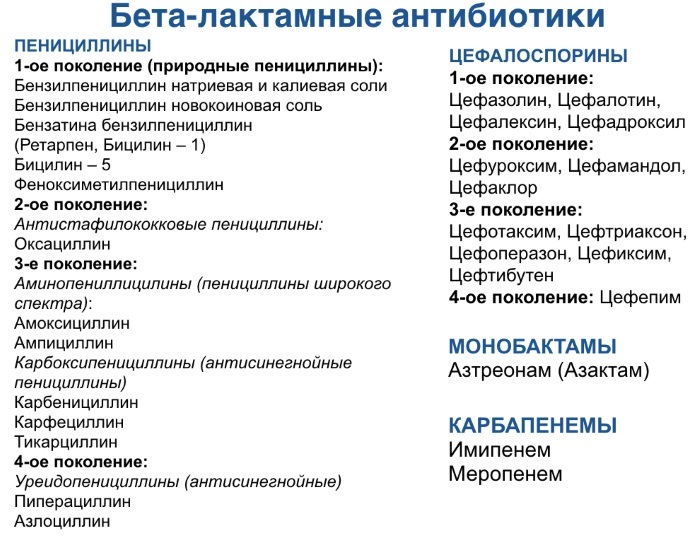
- cephalosporins, having a half synthetic etiology, as well as having a more advanced biochemical formula;
- carbapenems, which belongs to the subgroup of broad-spectrum beta-lactam antibacterial agents;
- macrolides, acting as synthetic antibiotics, the mechanism of action of which is aimed at disrupting the process of protein synthesis inside the cells of pathogenic microorganisms.
To quickly suppress the inflammatory process of an infectious nature, reduce the numerical population of pathogens microorganisms that cause symptoms of acute angina, a course of taking antibiotics of one of the above is sufficient pharmacological groups.
With ARVI, flu
Antibiotics at an adult's temperature, which is caused by ARVI, influenza or any other viral microorganism, are contraindicated for taking.
The restriction on the use of drugs in this category is due to the fact that their constituent components are not effective against viruses. Taking antibiotics will not bring a positive therapeutic effect, but will only lead to a decrease in the protective functions of the immune system, disrupt the stable balance of the intestinal microflora.
With pneumonia
Bacterial infection of the lower respiratory tract, which led to inflammation of the bronchopulmonary tissue, is always accompanied by the preservation of high body temperature, kept within 38-39°.
In this case, the following groups of antibacterial agents can be used to treat patients with pneumonia:
- tetracyclines, which are half synthetic medicines, used for the complex therapy of severe infections;
- glycopeptide antibiotics that have a bactericidal effect in violation of the synthesis of cell walls of pathogenic microorganisms;
- lincosamides, which have a bacteriostatic effect, but in the case of an increase in the therapeutic dosage, they can exhibit a pronounced bactericidal effect;
- fluoroquinolones, combining a whole range of antibacterial drugs (Ofloxacin, Moxifloxacin, Hemifloxacin, Sparfloxacin).
With pneumonia, it is possible to maintain high temperatures even after the start of a course of taking antibacterial agents. In most cases, on the 3-4th day of treatment, a gradual decrease in fever is observed, the heat exchange of the body is stabilized.
For infectious, inflammatory diseases
Inflammatory diseases of internal organs with different localization of the infectious process are treated with the use of antibacterial agents, related to groups:
- tetracyclines;
- macrolides;
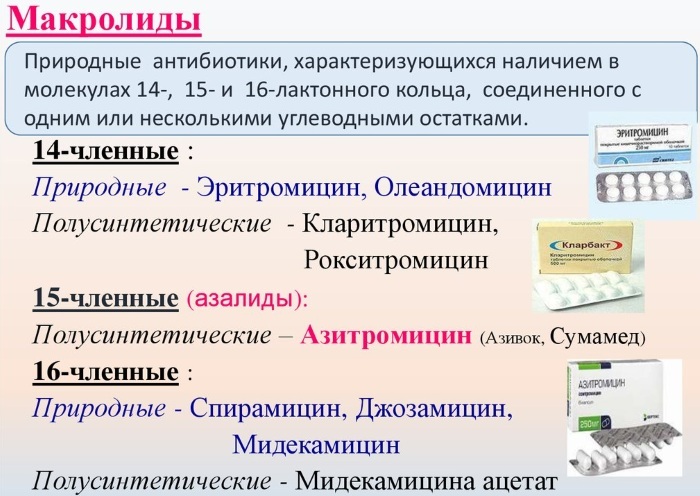
- cephalosporins;
- penicillins;
- fluoroquinolones;
- lincosamides;
- glycopeptide and beta-lactam drugs;
- chloramphenicol;
- aminoglycosides.
Each specific type of antibiotic is effective only against certain strains of bacterial infection. The selection of a medicinal product should be carried out by the attending physician based on the results of a microbiological study.
The best antibiotics in injections
Antibacterial drugs designed to suppress the infectious and inflammatory process, as well as to quickly reduce high body temperature, are introduced into the patient's body with the help of injections, tablets, capsules, prepared in advance suspension.
The use of an injection solution is the most justified from a therapeutic point of view, as it allows you to quickly achieve a positive effect and improve the general condition sick.
For children
Injectable antibiotics for children of younger, middle and older age groups are selected by a pediatrician, who is obliged to perform a preliminary examination of the patient.
Augmentin
Augmentin is an antibacterial agent that belongs to the group of penicillins. The active ingredient in this drug is clavulanic acid. Augmentin in the form of an injection solution is used for intramuscular and intravenous administration.
This antibiotic is used to treat:
- bronchitis;
- pneumonia;
- otitis media;
- sinusitis;
- sore throats;
- chronic tonsillitis, which are of bacterial origin and are accompanied by high body temperature.
It is approved for use in relation to children from 3 months. The dosage is determined individually, depending on the child's body weight and the type of bacterial disease.
Ciprofloxacin
Injection solution of the antibacterial agent Ciprofloxacin is a drug that belongs to the pharmaco-therapeutic group of fluoroquinolones. This medication is prescribed for children with signs of infection of the respiratory, digestive, cardiovascular, and urinary systems.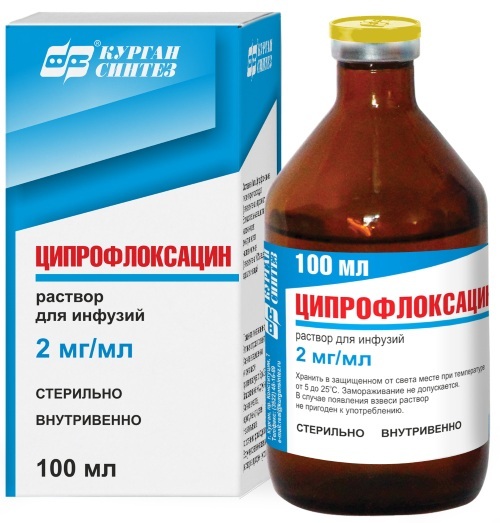
Ciprofloxacin is injected into the child's body intramuscularly or intravenously as part of a drip solution. This drug has a wide spectrum of action and is effective against most gram-positive, gram-negative bacteria, as well as anaerobic microorganisms.
Ceftriaxone
Ceftriaxone is a potent antibacterial agent that belongs to the pharmacological group of third generation cephalosporins. This drug is indicated for use in children who have reached the age of 12 years.
Ceftriaxone can be used to treat:
- hospital and community-based pneumonia;
- acute and chronic otitis media;
- meningitis of a bacterial origin;
- infectious lesions of bone and connective tissue;
- syphilis;
- bacterial infection of soft tissues;
- prevention of postoperative complications.
This drug is intended for intramuscular administration in a dosage that is set by the attending physician depending on the child's age and body weight.
For adults
Patients of the adult age group are being treated for infectious and inflammatory diseases using antibacterial drugs for intramuscular and intravenous therapy. A wide range of medicines of this category is presented on the modern market of pharmacological products.
Sultasin
Sultasin is an antibiotic from the aminopenicillin group, the main form of release of which is a white powder. To prepare an injection, you must dissolve this medication using saline. Sultasin is injected into the body of an adult patient intramuscularly or intravenously, depending on the medical indications for its use.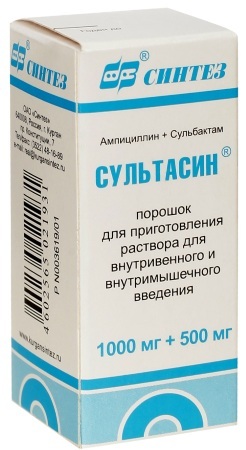
The mechanism of action of this antibiotic is that its active components in the form of ampicillin and sulbactam have a direct effect on protein metabolism in the cells of pathogenic microorganisms, disrupting their further division.
As bacteria die, the severity of the inflammatory process decreases and the overall body temperature normalizes.
Rocefin
Rocefin is a potent antibacterial agent from the pharmaco-therapeutic group of cephalosporins. This drug has a bactericidal effect.
The main advantage of Rocefin injection solution is that it does not slow down the cell division of bacteria, but completely destroys their structure. Dead infectious agents are excreted from the patient's body along with urine or feces. The active component of this drug is the synthetic substance ceftriaxone.
This medication can be injected into the patient's body intramuscularly or intravenously. The therapeutic dosage of Rocefin is 1-2 injections per day, 1-2 ml of solution.
Amoxiclav
Amoxiclav is a broad-spectrum antibiotic, the active ingredients of which are the chemical amoxicillin and clavulanic acid. This drug belongs to the category of semi-synthetic penicillins. In the human body, it exhibits a bactericidal effect, inhibiting the synthesis of the cell wall of infectious microorganisms.
Amoxiclav injection solution is indicated for use when:
- bronchitis;
- pneumonia;
- wound infections;
- cystitis;
- endometritis;
- urethritis;
- pyelonephritis;
- pleurisy;
- various kinds of dermatoses;
- complications of medical abortion.
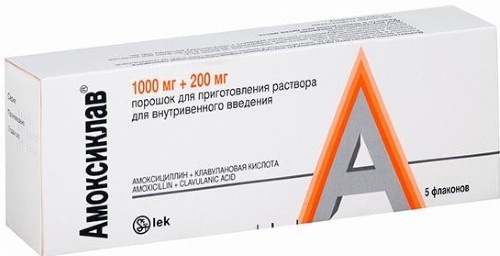 Amoxiclav is injected into the body of adult patients intravenously or intramuscularly, depending on the type of disease and the severity of the infectious and inflammatory process.
Amoxiclav is injected into the body of adult patients intravenously or intramuscularly, depending on the type of disease and the severity of the infectious and inflammatory process.
Tablet names
In the presence of contraindications to the use of injectable antibiotics, preparations of the tablet form of release can be used, which have a similar anti-infectious activity.
For children
Antibacterial drugs in pill form that are used to treat children must have a high degree of effectiveness, as well as being as safe as possible for a sensitive organism child.
Tetracycline
Tetracycline is an effective broad-spectrum antibiotic that has a bacteriostatic effect. The tablets of this drug are covered with a protective film, and are available in a dosage of 100 mg. Tetracycline is approved for use in children over 8 years of age.
This antibacterial agent is indicated for the treatment of:
- pneumonia;
- bronchitis;
- sore throats;
- tonsillitis;
- cholecystitis
- inflammatory diseases in the organs of the digestive system.
Sumamed
Sumamed is an antibiotic in the form of capsules, the active ingredient of which is azithromycin at a dosage of 1000 mg. This drug is completely safe for the child's body, and its high therapeutic efficacy allows you to successfully treat infectious diseases of the respiratory system, gastrointestinal tract, genitourinary system, infectious skin lesions cover.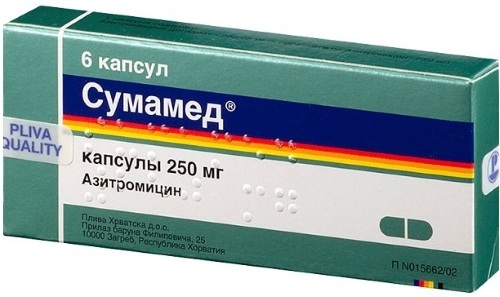
Sumamed is approved for admission to children aged 3 years and older, subject to the dosage of 10 mg of medication per 1 kg of the child's body weight. This drug is contraindicated in patients with a tendency to allergic reactions to macrolides, as well as severe liver disease.
Flemoklav Solutab
Flemoklav Solutab is a tableted antibacterial agent, which is indicated for use in relation to children aged 3 years and older.
This drug is used for therapy:
- bacterial pneumonia;
- bronchitis;
- urethritis;
- cystitis;
- tracheitis;
- tonsillitis;
- acute tonsillitis;
- sinusitis.
In the course of treatment with this antibiotic, side effects may appear in the form of:
- various kinds of allergic reactions;
- nausea;
- vomiting;
- flatulence;
- loss of appetite;
- changes in the functions of taste buds;
- darkening of the enamel of the teeth.
For adults
Patients in the adult age group who have signs of high fever caused by bacterial microorganisms, the use of tableted broad-spectrum antibiotics is shown actions.
Amoxicillin
Amoxicillin is a tablet antibiotic from the penicillin group that is indicated for use for the treatment of most infectious diseases accompanied by high temperatures body.
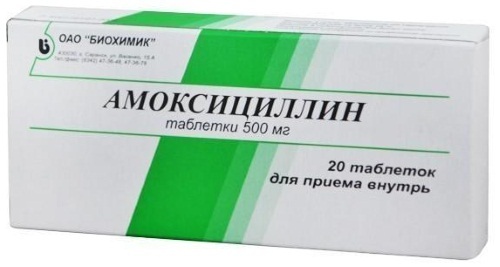
This drug is available in dosages of 250 and 500 mg. The minimum number of side effects and contraindications allows the use of this medication for women in the 3rd trimester of pregnancy (only in conditions of extreme necessary).
Azithromycin
Azithromycin is a potent antibacterial drug that is prescribed to treat:
- bronchitis;
- pneumonia;
- tracheitis;
- sore throats;
- acute and chronic tonsillitis;
- otitis media;
- sinusitis;
- sinusitis;
- frontitis.
This drug is available in the form of capsules made from edible gelatin. Azithromycin is contraindicated in men and women who have been diagnosed with renal failure, severe damage to liver tissue, a tendency to allergic reactions to antibacterial agents.
Suprax
Suprax is an antibacterial agent that comes in the form of white capsules. This medication contains the active substance cefixime.
The main purpose of this drug is to treat infectious diseases of the upper and lower airways, which are accompanied by acute or chronic inflammation, as well as high fever body.
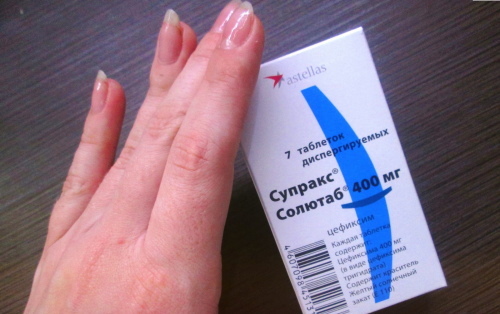
With prolonged therapy with Suprax capsules, it is possible:
- development of intestinal dysbiosis;
- indigestion;
- flatulence;
- loss of appetite;
- attacks of spasmodic pain inside the abdominal cavity.
This drug is contraindicated in people with severe liver and kidney disease.
The cheapest antibiotics for temperature
Antibiotics at a temperature in an adult can be used during a therapeutic course, the duration of which is determined only by the attending physician. The table below lists the main antibacterial agents that are the most affordable from a financial point of view.
| Name of the medication | The cost of the drug |
| Amoxicillin in capsules with a dosage of 500 mg (16 pcs.) | RUB 85 |
| Tsiprolet in tablets of 500 mg (10 pcs.) | RUB 105 |
| Trichopolum tablets of 250 mg (20 pcs.) | RUB 87 |
| Levomycetin Aktitab (10 tablets of 500 mg) | RUB 80 |
| Zinnat (125 mg granules for preparing a liquid suspension) | 195 RUB |
These drugs are among the cheapest, but at the same time they have high antibacterial activity.
List of the safest drugs
At all stages of the fight against high body temperature by eliminating the focus of acute or chronic infection, very it is important to use only high-quality antibiotics that have a minimum number of contraindications and side effects effects.
The following are the safest drugs in this category:
- Fluimucil;
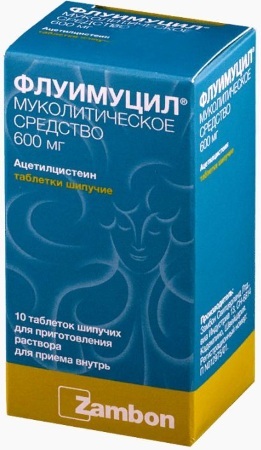
- Sumamed;
- Polydex with added phenylephrine;
- Azithromycin;
- Amoxicillin;
- Tetracycline;
- Amoxiclav;
- Tsiprolet.
The sale of the above antibacterial drugs is carried out on the basis of a prescription from the attending physician.
Antibiotics are a separate category of powerful drugs that are used to fight against bacterial microorganisms that cause inflammation of individual tissues and internal organs person.
At a high body temperature, which is found in an adult or a child, these medicines are used as part of a general therapeutic course along with antipyretic drugs. The course of taking antibacterial drugs allows you to eliminate foci of chronic or acute infection, suppress the inflammatory process and normalize body heat metabolism.
Medicines in this category should be used only after the strain of the bacterial infection that caused a particular disease has been established in laboratory conditions.
Antibiotic videos
Komarovsky will tell you when antibiotics are needed:



